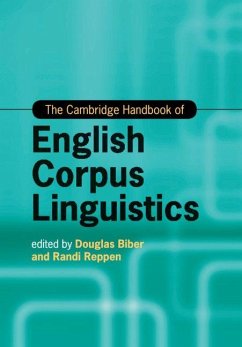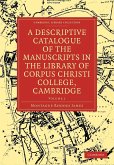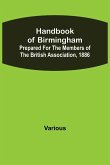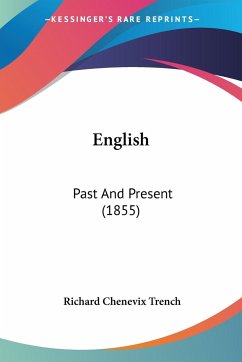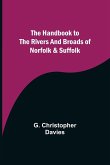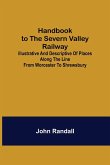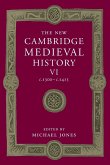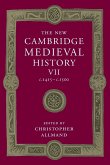The Cambridge Handbook of English Corpus Linguistics
Herausgeber: Biber, Douglas; Reppen, Randi
The Cambridge Handbook of English Corpus Linguistics
Herausgeber: Biber, Douglas; Reppen, Randi
- Broschiertes Buch
Andere Kunden interessierten sich auch für
![A Descriptive Catalogue of the Manuscripts in the Library of Corpus Christi College, Cambridge A Descriptive Catalogue of the Manuscripts in the Library of Corpus Christi College, Cambridge]() Montague Rhodes JamesA Descriptive Catalogue of the Manuscripts in the Library of Corpus Christi College, Cambridge62,99 €
Montague Rhodes JamesA Descriptive Catalogue of the Manuscripts in the Library of Corpus Christi College, Cambridge62,99 €![Handbook of Birmingham; Prepared for the Members of the British Association, 1886 Handbook of Birmingham; Prepared for the Members of the British Association, 1886]() VariousHandbook of Birmingham; Prepared for the Members of the British Association, 188625,99 €
VariousHandbook of Birmingham; Prepared for the Members of the British Association, 188625,99 €![English English]() Richard Chenevix TrenchEnglish30,99 €
Richard Chenevix TrenchEnglish30,99 €![The Handbook to the Rivers and Broads of Norfolk & Suffolk The Handbook to the Rivers and Broads of Norfolk & Suffolk]() G. Christopher DaviesThe Handbook to the Rivers and Broads of Norfolk & Suffolk19,99 €
G. Christopher DaviesThe Handbook to the Rivers and Broads of Norfolk & Suffolk19,99 €![Handbook to the Severn Valley Railway; Illustrative and Descriptive of Places along the Line from Worcester to Shrewsbury Handbook to the Severn Valley Railway; Illustrative and Descriptive of Places along the Line from Worcester to Shrewsbury]() John RandallHandbook to the Severn Valley Railway; Illustrative and Descriptive of Places along the Line from Worcester to Shrewsbury17,99 €
John RandallHandbook to the Severn Valley Railway; Illustrative and Descriptive of Places along the Line from Worcester to Shrewsbury17,99 €![The New Cambridge Medieval History The New Cambridge Medieval History]() The New Cambridge Medieval History155,99 €
The New Cambridge Medieval History155,99 €![The New Cambridge Medieval History The New Cambridge Medieval History]() The New Cambridge Medieval History149,99 €
The New Cambridge Medieval History149,99 €-
-
-
Produktdetails
- Verlag: Cambridge University Press
- Seitenzahl: 642
- Erscheinungstermin: 16. April 2020
- Englisch
- Abmessung: 244mm x 170mm x 34mm
- Gewicht: 1090g
- ISBN-13: 9781108744355
- ISBN-10: 1108744354
- Artikelnr.: 59584401
Hinweis: Dieser Artikel kann nur an eine deutsche Lieferadresse ausgeliefert werden.
- Herstellerkennzeichnung
- Libri GmbH
- Europaallee 1
- 36244 Bad Hersfeld
- gpsr@libri.de
Introduction Douglas Biber and Randi Reppen
Part I. Methodological Considerations: 1. Corpora: an introduction Mark Davies
2. Computational tools and methods for corpus compilation and analysis Paul Rayson
3. Quantitative designs and statistical techniques Stefan Th. Gries
Part II. Corpus Analysis of Linguistic Characteristics: 4. Discourse intonation: a corpus-driven study of prominence on pronouns Winnie Cheng
5. Keywords Jonathan Culpeper and Jane Demmen
6. Collocation Richard Xiao
7. Phraseology Bethany Gray and Douglas Biber
8. Descriptive grammar Geoffrey Leech
9. Grammatical variation Daniela Kolbe-Hanna and Benedikt Szmrecsanyi
10. Grammatical change Martin Hilpert and Christian Mair
11. Lexical grammar Susan Hunston
12. Using corpora in discourse analysis Alan Partington and Anna Marchi
13. Pragmatics Brian Clancy and Anne O'Keeffe
14. Historical pragmatics Irma Taavitsainen
Part III. Corpus Analysis of Varieties: 15. Spoken discourse Shelley Staples
16. Corpora and written academic English Ken Hyland
17. Register variation Susan Conrad
18. Diachronic registers Merja Kytö and Erik Smitterberg
19. Literary style and literary texts Michaela Mahlberg
20. Dialect variation Jack Grieve
21. World Englishes Marianne Hundt
22. New answers to familiar questions: English as a lingua franca Anna Mauranen, Ray Carey and Elina Ranta
23. Learner language Gaëtanelle Gilquin and Sylviane Granger
Part IV. Other Applications of Corpus Analysis: 24. Vocabulary Ron Martinez and Norbert Schmitt
25. Lexicography and phraseology Magali Paquot
26. Classroom applications of corpus analysis Thomas Cobb and Alex Boulton
27. Corpus versus non-corpus informed pedagogical materials: grammar as the focus Fanny Meunier and Randi Reppen
28. Translation Silvia Bernardini.
Part I. Methodological Considerations: 1. Corpora: an introduction Mark Davies
2. Computational tools and methods for corpus compilation and analysis Paul Rayson
3. Quantitative designs and statistical techniques Stefan Th. Gries
Part II. Corpus Analysis of Linguistic Characteristics: 4. Discourse intonation: a corpus-driven study of prominence on pronouns Winnie Cheng
5. Keywords Jonathan Culpeper and Jane Demmen
6. Collocation Richard Xiao
7. Phraseology Bethany Gray and Douglas Biber
8. Descriptive grammar Geoffrey Leech
9. Grammatical variation Daniela Kolbe-Hanna and Benedikt Szmrecsanyi
10. Grammatical change Martin Hilpert and Christian Mair
11. Lexical grammar Susan Hunston
12. Using corpora in discourse analysis Alan Partington and Anna Marchi
13. Pragmatics Brian Clancy and Anne O'Keeffe
14. Historical pragmatics Irma Taavitsainen
Part III. Corpus Analysis of Varieties: 15. Spoken discourse Shelley Staples
16. Corpora and written academic English Ken Hyland
17. Register variation Susan Conrad
18. Diachronic registers Merja Kytö and Erik Smitterberg
19. Literary style and literary texts Michaela Mahlberg
20. Dialect variation Jack Grieve
21. World Englishes Marianne Hundt
22. New answers to familiar questions: English as a lingua franca Anna Mauranen, Ray Carey and Elina Ranta
23. Learner language Gaëtanelle Gilquin and Sylviane Granger
Part IV. Other Applications of Corpus Analysis: 24. Vocabulary Ron Martinez and Norbert Schmitt
25. Lexicography and phraseology Magali Paquot
26. Classroom applications of corpus analysis Thomas Cobb and Alex Boulton
27. Corpus versus non-corpus informed pedagogical materials: grammar as the focus Fanny Meunier and Randi Reppen
28. Translation Silvia Bernardini.
Introduction Douglas Biber and Randi Reppen
Part I. Methodological Considerations: 1. Corpora: an introduction Mark Davies
2. Computational tools and methods for corpus compilation and analysis Paul Rayson
3. Quantitative designs and statistical techniques Stefan Th. Gries
Part II. Corpus Analysis of Linguistic Characteristics: 4. Discourse intonation: a corpus-driven study of prominence on pronouns Winnie Cheng
5. Keywords Jonathan Culpeper and Jane Demmen
6. Collocation Richard Xiao
7. Phraseology Bethany Gray and Douglas Biber
8. Descriptive grammar Geoffrey Leech
9. Grammatical variation Daniela Kolbe-Hanna and Benedikt Szmrecsanyi
10. Grammatical change Martin Hilpert and Christian Mair
11. Lexical grammar Susan Hunston
12. Using corpora in discourse analysis Alan Partington and Anna Marchi
13. Pragmatics Brian Clancy and Anne O'Keeffe
14. Historical pragmatics Irma Taavitsainen
Part III. Corpus Analysis of Varieties: 15. Spoken discourse Shelley Staples
16. Corpora and written academic English Ken Hyland
17. Register variation Susan Conrad
18. Diachronic registers Merja Kytö and Erik Smitterberg
19. Literary style and literary texts Michaela Mahlberg
20. Dialect variation Jack Grieve
21. World Englishes Marianne Hundt
22. New answers to familiar questions: English as a lingua franca Anna Mauranen, Ray Carey and Elina Ranta
23. Learner language Gaëtanelle Gilquin and Sylviane Granger
Part IV. Other Applications of Corpus Analysis: 24. Vocabulary Ron Martinez and Norbert Schmitt
25. Lexicography and phraseology Magali Paquot
26. Classroom applications of corpus analysis Thomas Cobb and Alex Boulton
27. Corpus versus non-corpus informed pedagogical materials: grammar as the focus Fanny Meunier and Randi Reppen
28. Translation Silvia Bernardini.
Part I. Methodological Considerations: 1. Corpora: an introduction Mark Davies
2. Computational tools and methods for corpus compilation and analysis Paul Rayson
3. Quantitative designs and statistical techniques Stefan Th. Gries
Part II. Corpus Analysis of Linguistic Characteristics: 4. Discourse intonation: a corpus-driven study of prominence on pronouns Winnie Cheng
5. Keywords Jonathan Culpeper and Jane Demmen
6. Collocation Richard Xiao
7. Phraseology Bethany Gray and Douglas Biber
8. Descriptive grammar Geoffrey Leech
9. Grammatical variation Daniela Kolbe-Hanna and Benedikt Szmrecsanyi
10. Grammatical change Martin Hilpert and Christian Mair
11. Lexical grammar Susan Hunston
12. Using corpora in discourse analysis Alan Partington and Anna Marchi
13. Pragmatics Brian Clancy and Anne O'Keeffe
14. Historical pragmatics Irma Taavitsainen
Part III. Corpus Analysis of Varieties: 15. Spoken discourse Shelley Staples
16. Corpora and written academic English Ken Hyland
17. Register variation Susan Conrad
18. Diachronic registers Merja Kytö and Erik Smitterberg
19. Literary style and literary texts Michaela Mahlberg
20. Dialect variation Jack Grieve
21. World Englishes Marianne Hundt
22. New answers to familiar questions: English as a lingua franca Anna Mauranen, Ray Carey and Elina Ranta
23. Learner language Gaëtanelle Gilquin and Sylviane Granger
Part IV. Other Applications of Corpus Analysis: 24. Vocabulary Ron Martinez and Norbert Schmitt
25. Lexicography and phraseology Magali Paquot
26. Classroom applications of corpus analysis Thomas Cobb and Alex Boulton
27. Corpus versus non-corpus informed pedagogical materials: grammar as the focus Fanny Meunier and Randi Reppen
28. Translation Silvia Bernardini.

